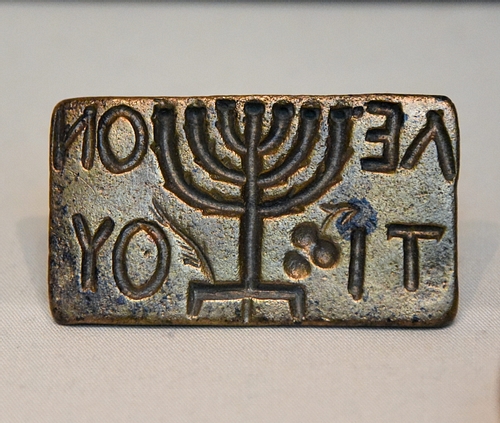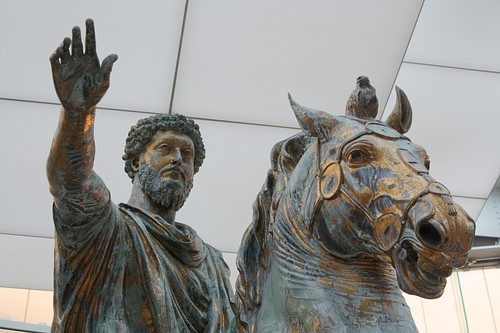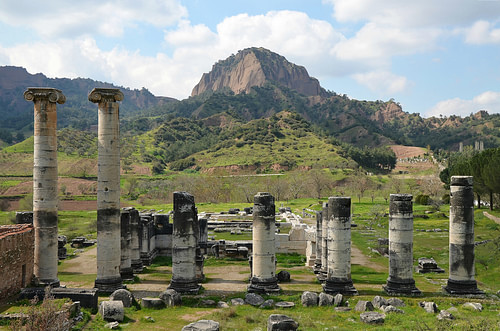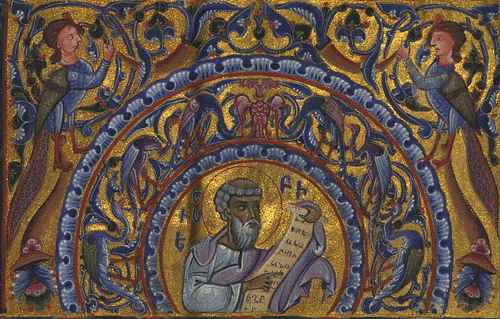Melito of Sardis (d. c. 180 CE) was a bishop in the city of Sardis (near modern-day Sart, Turkey) who was regarded as one of the greatest Christian thinkers, writers, and apologists of his time. In the modern age, he is best known for his Apology for Christianity sent to emperor Marcus Aurelius regarding the persecution of Christians.
He is also, however, recognized for his lists of Old Testament works, commentary on scripture, and advocacy of celebrating Easter at the same time as the Jewish Passover in order to maintain the relationship between Judaism and Christianity. His work Peri Pascha (On the Pascha or On the Passover), only discovered in the past 100 years, focuses on the validity of the practice of those known as Quartodecimans who maintained that Easter needed to be celebrated on the 14th of the month Nisan (March-April) in keeping with the Jewish tradition of Passover and, because of this and other details in his works, it is believed he was a convert from Judaism.
At the same time, Melito has also been criticized for encouraging the charge of deicide against the Jews in his Peri Pascha, claiming that the Jews killed Christ, an argument used to justify persecution of the Jews in his time and up to the present. Although this work was only discovered in 1940, it was cited by ancient writers such as Eusebius and so was known after Melito’s time. Defenders of Melito, however, note that he is actually only repeating or commenting on lines from the New Testament where the deicide charge originates.
Melito has also been identified as the “angel” of the church at Sardis addressed in the Book of Revelation 3:1 who is chastised, along with his church for having “a reputation for being alive, but you are dead”, interpreted as meaning the church and its leader maintained an appearance of piety without any substance. This claim is untenable as Revelation is dated to c. 95 CE, before Melito’s time, and Melito later wrote a commentary on the work.
During the reign of Marcus Aurelius (161-180), Melito sent him the now-famous Apology for Christianity asking Aurelius to end the persecutions of Christians in Asia Minor. Throughout the Apology (a defense), Melito addresses Aurelius as a sympathetic protector, not a persecutor, and the document is often cited by scholars who maintain that Aurelius did not issue any edicts authorizing the persecution of Christians but, instead, tried to protect them.
Melito’s Apology, usually dated to c. 169-170, may never have reached Aurelius who was away from Rome on campaign along the Danube, and its points were ignored by his successors, notably Diocletian (r. 284-305), whose persecutions made him infamous throughout the Christian community. Melito died, possibly as a result of the persecutions he describes in Apology, in c. 180.
Melito’s Works
Nothing is known of Melito’s life. He was a contemporary of some of the best-known Christian writers and thinkers of the 2nd century including Clement of Alexandria (l.c. 150-c. 215), Polycarp (l. 69-155), Polycrates (l.c. 130-196), and Tertullian (l.c. 155-c.220). He was most likely from a Jewish background and was well-educated. His work also strongly suggests a background in Stoic philosophy.
A list of his works, and brief commentary on his life, is given by the Christian historian-propagandist Eusebius (l. c. 260-339) who refers to him as living as a eunuch (understood to mean he remained unmarried throughout his life) who was wholly devoted to serving God (Ecclesiastical History V.24.5). He is also identified as the Bishop of Sardis who was involved in the argument over the observance of Easter. Eusebius gives his known works as:
- Apology for Christianity
- On the Christian Life and the Prophets
- On the Church
- On the Lord’s Day
- On the Passover
Eusebius also mentions other works (there seem to have been at least fourteen) no longer extant in his time covering topics including creation, Christ, faith, baptism, the soul, the devil, and the Book of Revelation. Melito also wrote an apology to Aurelius’ predecessor Antoninus Pius (r. 138-161). Although this claim has been challenged, and some scholars argue it was addressed to another emperor, the text of the piece itself, and Melito’s approximate death date, argue for Antoninus. As he was a popular author, there were many other works ascribed to him which were clearly written by others or long after his death.
Eusebius also mentions other writings referenced in letters by Melito to a colleague named Onesimus who had requested information on the books of the Old Testament. According to the letters, Melito also wrote on the Pentateuch and the books of Joshua, Judges, Ruth, II Kings, II Chronicles, Psalms, Proverbs, Ecclesiastes, and many other Old Testament narratives. Scholars have noted how the reference to an “Old Testament” means that there must have been a “New Testament” already established by Melito’s time and this has enabled a better understanding of the development of the Bible by modern historians, theologians, and biblical scholars.
Charge of Antisemitism
Eusebius discusses Melito’s Peri Pascha and identifies him as a Quartodeciman (from the Latin meaning “fourteenth”) referring to those who insisted that Passover should be celebrated on the 14th of the month of Nisan and, further, that Passover should be observed instead of Easter because, in the gospels, Jesus Christ presides over a Passover meal and Easter celebrations, obviously, did not exist. This controversy also involved the question of whether Passover/Easter should be celebrated on a specific day of the month or of the week during which Christ was said to have died and been resurrected.

Melito argued for the Quartodeciman side as the churches of Asia Minor traditionally celebrated Passover in remembrance of Christ on the 14th of Nisan. In an effort at standardizing Church practice, the bishops of Rome condemned the Quartodecimans, insisting that Easter must always be celebrated on a Sunday and, specifically, the Sunday following the first full moon after the spring equinox. The question was finally resolved in favor of the bishops of Rome at the Council of Nicea in 325.
In his Peri Pascha, Melito does not discuss this controversy directly but focuses on the meaning of Passover for Christians. He bases his arguments on the Gospel of John (which seems to have been the narrative he favored in the rest of his work) which, according to Polycarp, Bishop of Smyrna, was written by John, the apostle of Christ, and so was most accurate. Polycarp claimed that John had instituted the celebration of Passover on 14 Nisan and Melito argues that this should be enough to justify the continued practice. Throughout the work, Melito identifies with Jewish tradition, even seeming to base sections on the Jewish Haggadah, the text used in observing the Passover seder.
At the same time, he seems to encourage the charge of deicide against the Jews in claiming “the King of Israel was killed by the Israelites” but, as modern scholars have noted, he is here repeating the charge as it appears in the gospels of the New Testament and, as Melito favored the Gospel of John, specifically in John 5:16-18:
And therefore did the Jews persecute Jesus, and sought to slay him, because he had done these things on the sabbath day. But Jesus answered them, My Father worketh hereto, and I work. Therefore, the Jews sought the more to kill him, because he not only had broken the sabbath, but said also that God was his Father, making himself equal to God.
Melito’s reference to the Jews killing Jesus has led to the charge that he was antisemitic and encouraged the persecution of the Jews, but this claim is not supported by the text nor by the cultural values of Sardis which was a religiously diverse city. Melito, in fact, encourages forgiveness, compassion, and reconciliation with God for all people, including the Jews, who were hardly marginalized at Sardis and made up a significant percentage of the population from the 3rd century BCE onwards, just as Christians would later. The claim that Melito was antisemitic or encouraged abuse of the Jewish community of Sardis or elsewhere is untenable. Any passages interpreted as antisemitic in his work are typical of Christian writings of his time and for many centuries afterward.
Persecution Under Aurelius
When Sardis was controlled by the Seleucid Empire (312-63 BCE), King Antiochus III (the Great, r. 223-187 BCE) encouraged Jews to move there to increase the population. By the 1st century CE, when the city was under Roman control, Jewish rights to freedom of religion were upheld and this policy continued under Hadrian (r. 117-138) and Antoninus Pius, both of whom were also charitable toward the new sect of Christianity which, at that time in Asia Minor, was still associated with Judaism. The same religious tolerance shown to the Jewish community at Sardis seems to have been granted to the Christians.

Even so, under Marcus Aurelius, the Christians of Asia Minor collectively, and at Sardis specifically, were subject to persecution which included exorbitant taxation and confiscation of homes and goods. This persecution has regularly been attributed to an imperial decree by Aurelius, but modern scholarship has challenged and rejected this claim. Scholar Donald J. Robertson references an edict issued by Aurelius in 161, the first year he came to power, addressing the persecution of Christians and prohibiting the practice:
[Aurelius] explicitly refers to the problem of Christians who are regarded by Romans as atheists because they do not worship the conventional pagan gods. Marcus warns the provincial authorities: “you harass these men, and harden them in their convictions, to which they hold fast, by accusing them of being atheists”. He states that provincial governors had many times written to his adoptive father, the Emperor Antoninus Pius, whose response was always “not to molest such persons” unless they were actually making attempts to undermine the Roman government. Marcus says he has also frequently repeated this non-harassment policy to them himself, as Emperor. He actually goes so far as to say: “And if anyone persist in bringing any such [Christian] person into trouble for being what he is, let him, against whom the charge is brought, be acquitted even if the charge be made out, but let him who brings the charge be called to account.” In other words, he suggests that provincial authorities may be punished by Rome for persecuting Christians solely on the basis of their religion. (4)
This would have been the understanding Melito had of Aurelius when he sent him his Apology for Christianity: provincial governors were encouraging the persecution of Christians, not the emperor himself.
The Text
The section of the Apology given below (like the earlier one to Antoninus) is cordial in tone as though Melito is addressing a friend. He begins by describing the persecution of Christians in Asia Minor and asking for Aurelius to intercede on their behalf. He then points out how Rome has flourished since the advent of Christianity and Christians have only been persecuted under “bad emperors” such as Nero and Domitian. He appeals to Aurelius’ adoptive ancestry by citing Hadrian and Antoninus Pius and their favorable policies toward Christians and notes Hadrian’s edict of c. 122 to the pro-consul of Asia Minor, Gaius Minicius Fundanus (l. 2nd century), ensuring any Christian accused of a crime would be treated fairly in a court of law. The Apology concludes with a reminder of Aurelius’ own charitable policies toward Christians and Melito’s expectation that he will intercede on their behalf.
The following passage is taken from Collected Works of Melito of Sardis, translator unknown, but possibly Jane L. Lightfoot:
For the race of the pious is now persecuted in a way contrary to all precedent, being harassed by a new kind of edict everywhere in Asia. For unblushing informers, and such as are greedy of other men’s goods, taking occasion from the orders issued, carry on their robbery without any disguise, plundering of their property night and day those who are guilty of no wrong.
If these proceedings take place at thy bidding, well and good. For a just sovereign will never take unjust measures; and we, on our part, gladly accept the honor of such a death. This request only we present to thee: that thou wouldst first of all examine for thyself into the behavior of these reputed agents of so much strife, and then come to a just decision as to whether they merit death and punishment or deserve to live in safety and quiet. But if, on the contrary, it shall turn out that this measure, and this new sort of command, which it would be unbecoming to employ even against barbarian foemen, do not proceed from thee, then all the more do we entreat thee not to leave us thus exposed to spoilation of the populace.
For the philosophy current with us flourished in the first instance among barbarians; and, when it afterwards sprang up among the nations under thy rule, during the distinguished reign of thy ancestor, Augustus, it proved to be a blessing of most happy omen to thy empire. For from that time, the Roman power has risen to greatness and splendor. To this power thou hast succeeded as the much-desired possessor; and such shalt thou continue, together with thy son, if thou protect that philosophy which has grown up with thy empire, and which took its rise with Augustus; to which also thy more recent ancestors paid honor, along with the other religions prevailing in the empire.
A very strong proof, moreover, that it was for good that the system we profess came to prevail at the same time that the empire of such happy commencement was established, is this: that ever since the reign of Augustus, nothing untoward has happened; but, on the contrary, everything has contributed to the splendor and renown of the empire, in accordance with the devout wishes of all. Nero and Domitian, alone of all the emperors, imposed upon by certain calumniators, have cared to bring any impeachment against our doctrines. They, too, are the source from which it has happened that the lying slanders on those who profess them have, in consequence of the senseless habit which prevails of taking things on hearsay, flowed down to our own times.
But the course which they, in their ignorance, pursued was set aside by thy pious progenitors, who frequently and in many instances rebuked by their rescripts those who dared to set on foot any hostilities against them. It appears, for example, that thy grandfather Hadrian wrote, among others, to Fundanus, the proconsul then in charge of Asia. Thy father, too, when thou thyself was associated with him in the administration of the empire, wrote to the cities, forbidding them to take any measures adverse to us; among the rest to the people of Larissa, and of Thessalonica, and of Athens and, in short, to all the Greeks.
And, as regards thyself, seeing that thy sentiments respecting the Christians are not only the same as theirs, but even much more generous and wise, we are the more persuaded that thou wilt do all that we ask of thee.
Conclusion
As noted, it is unclear whether Aurelius ever received the work as he was away on campaign at the time it is thought to have been written and sent to Rome. It is evident, however, that the persecutions Melito describes continued after the generally accepted date of the Apology of 169-170. That the mistreatment of Christians in Asia Minor was the work of provincial administrators, not of Aurelius, is evident in that they continued in the same way following his death and the same sort of harassment would later be visited on the Christian and non-Christian Visigoths in the 4th century.
It does not seem, then, that the Christians of Melito’s time were persecuted for their religious beliefs but because they were a minority population and could be targeted for abuse without fear of reprisal. Even after the edicts of Hadrian, Antoninus, and Aurelius, these kinds of persecutions were still encouraged in Asia Minor, and elsewhere in the Roman Empire, arguing for greed as the primary motivation in the confiscation of goods and homes, not necessarily religious differences, though religion would certainly have played a part.
Melito’s death date is unknown but is thought to be around 180 and it is possible he was killed in the course of the very persecutions he hoped his Apology would put a stop to. His reputation as a scholar and devout religious leader only grew after his death and, today, he continues to be remembered as one of the greatest apologists of the early church who was confident enough in his faith to write to emperors as though they were friends.







